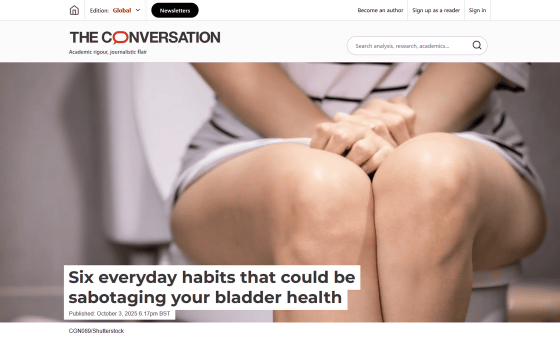What are the 6 habits that put your bladder at risk?

Six everyday habits that could be sabotaging your bladder health
https://theconversation.com/six-everyday-habits-that-could-be-sabotaging-your-bladder-health-262899

Kamdar points out that the bladder is an organ that is often overlooked until it causes problems, but it needs to be cared for just like the heart or lungs. Neglecting proper care not only increases the risk of discomfort and urinary tract infections, but can also lead to serious conditions such as incontinence and cancer. Kamdar teaches the following 'six habits that put your bladder at risk.'
◆1: Holding in urination for a long time
When you hold your bladder for a long time, the accumulated urine stretches your bladder. Over time, this can weaken the bladder's ability to contract and release urine, potentially leading to a condition called urinary retention . Chronic urinary retention can also damage the kidneys, and research has shown that holding urine in the bladder increases the amount of time bacteria can grow, increasing the risk of urinary tract infections.
That's why experts recommend emptying your bladder by urinating every three to four hours. Relaxation is key to emptying your bladder, and Kamdar advises women, in particular, to sit firmly on the toilet to relax their pelvic floor muscles, and wait 10 to 20 seconds after urinating before trying again to make sure your bladder is empty.
◆2: Not drinking enough fluids
When dehydration causes urine to become more concentrated, it irritates the bladder's lining, increasing the risk of infection. Therefore, aiming to drink 6-8 glasses (about 1.5-2 liters) of fluid per day to prevent dehydration will help protect your bladder. While lack of fluid can also lead to constipation, hard stools can also irritate the bladder and pelvic floor, making it difficult to control urination.

3. Excessive caffeine and alcohol intake
Caffeine and alcohol are mild diuretics, stimulating the bladder and increasing urine production. A 2011
Another study found that men who drink six to 10 alcoholic drinks per week are more likely to experience lower urinary tract symptoms, including urinary urgency and frequency, compared with men who drink less. 'Cutting down your alcohol intake can help relieve bladder symptoms and reduce your long-term risk,' Kamdar advised.
◆4: Smoking
When you smoke, chemicals enter your bloodstream, are filtered by your kidneys, and accumulate in your urine. This process releases carcinogenic chemicals that irritate the lining of your bladder, making smoking a major cause of bladder cancer . Smokers have up to four times the risk of developing bladder cancer compared to non-smokers, and the risk is even higher if they start smoking at a young age or have smoked cigars or pipes for many years.

◆5: Unhygienic behavior when defecating
If the urinary tract is not hygienic, bacteria and other pathogens are more likely to enter the body through the urinary tract. For example, wiping from the anus to the urethra when using toilet paper, or neglecting to wash your hands, can disrupt the body's microbiome and increase the risk of urinary tract infections.
Bacteria can also enter the urinary tract from the intestines or vagina through sexual intercourse. In this case, both men and women can reduce the risk of infection by urinating immediately after sex.
6. Unhealthy diet and lack of exercise
It may be surprising, but the type of food you eat and the amount of exercise you do can also affect your bladder. Being overweight naturally puts more pressure on your bladder, increasing the likelihood of urinary incontinence. By controlling your weight through proper diet and exercise and preventing constipation, you can avoid unnecessary pressure on your bladder.
Additionally, certain foods and drinks, such as carbonated drinks, spicy foods, citrus fruits, and artificial sweeteners, can irritate the bladder and worsen symptoms in people who already have bladder problems. 'To protect both your digestive and bladder health, aim for a high-fiber diet, including plenty of whole grains, fruits, and vegetables,' Kamdar advises.

Related Posts:
in Science, Posted by log1h_ik







